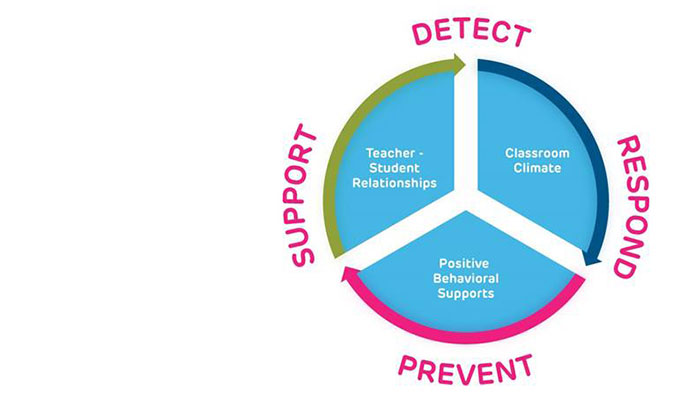HOW CAN WE HELP YOU? Call 1-800-TRY-CHOP
In This Section
Training Teachers to Detect, Prevent, and Intervene with Bullying

The BCCU program aims to educate teachers on preventing and responding to bullying in the classroom.
shafere1 [at] chop.edu (By Emily Shafer)
Bullying is a public health concern with a high prevalence that has a significant negative influence on a child's well-being. Teachers have the potential to recognize bullying and intervene, but they often don't have the important knowledge and skills to do so. Researchers at Children's Hospital of Philadelphia's Center for Violence Prevention (CVP) are addressing that gap with the Bullying Classroom Check-Up (BCCU) program.
The BCCU program is a teacher-consultation program that coaches teachers to detect, prevent, and respond to bullying inside of the elementary school classroom. A research team comprising researchers from CHOP and Johns Hopkins University will be implementing and evaluating the program with funding from the Eunice Kennedy Shriver National Institute of Child Health & Human Development.
"We adapted a program that teaches classroom management skills for teachers using a coaching model for use with bullying, with a strong focus on social emotional skills," said Tracy Waasdorp, PhD, MEd, director of research for School-Based Bullying and Social-Emotional Learning at CVP, and assistant research faculty at the University of Pennsylvania, and one of the study's primary investigators. "The coaching program educates teachers to identify when bullying is occurring, how to quickly diffuse it, and how to maintain a preventive and supportive environment in the classroom."

The BCCU Program Logo
The BCCU program was first tested in five middle schools, where it demonstrated improved teacher attitudes and skills in bullying prevention. In this study, the program will be tested in in 32 elementary schools in Philadelphia and in the Baltimore metro area over a five-year period. Schools will be randomized to receive the BCCU intervention, or to receive a different professional development program.
"Bullying rates typically peak in middle school, so the BCCU program can have the strongest impact during the late elementary school years prior to this surge," said Brooke Paskewich, PsyD, a director of operations for School-Based Bullying and Social-Emotional Learning at CVP, and a co-investigator on the study. "In addition, kids in elementary school usually spend most of their time with just one or two teachers, and we think a focus on these influential teachers can really make a difference, compared to middle school, where kids often have more teachers for different subjects."
The program features three main components. First is school-wide professional development modules that focus on raising awareness and knowledge about bullying (e.g., signs of aggression, impacts on students) and concrete strategies to engage in bullying detection, prevention, and intervention skills. Second is a teacher coaching model based on motivational interviewing that will improve teachers' and skills empower them to engage in self-guided changes related to managing bullying and classroom behavior management practices. The third is a mixed-reality simulator in which teachers interact with five student avatars to practice their skills and receive feedback from a coach.
"What's different about this program is that it focuses on both classroom management skills and bullying, whereas most programs focus classroom management alone and rarely on bullying," Dr. Waasdorp said. "Most bullying programs are also kid-focused, and not teacher-focused. With the motivational interviewing and the mixed-reality simulations, we are helping to provide teachers the skills they need to shift from treating bullying as a behavioral issue to treating it as a socially and emotionally taxing experience, thus shifting their response to bullying in the classroom."
The teacher-focused program allows them to direct their journey and set goals through motivational interviewing techniques with a coach. In their didactic instruction, they learn foundational knowledge about bullying, classroom management strategies that incorporate social emotional learning, and strategies to prevent, detect, and intervene with bullying.
"The goal of the BCCU program is to increase the social emotional connection between teachers and kids because research has shown that the better that connection is, the more other areas improve," Dr. Paskewich said. "A lot of teacher training has an academic structural focus. This program encourages teachers to also consider the social emotional connection alongside classroom management, so they can respond in a quick, clear, and consistent manner, showing they care, yet shifting the focus back on learning."